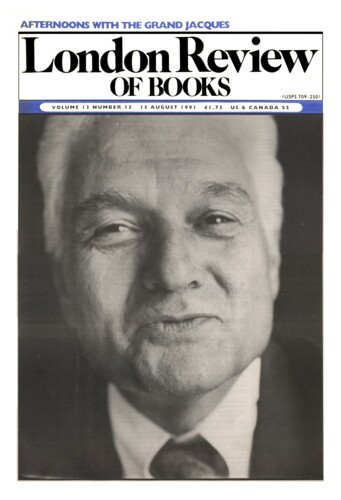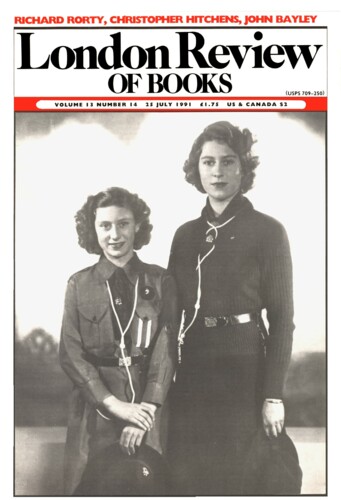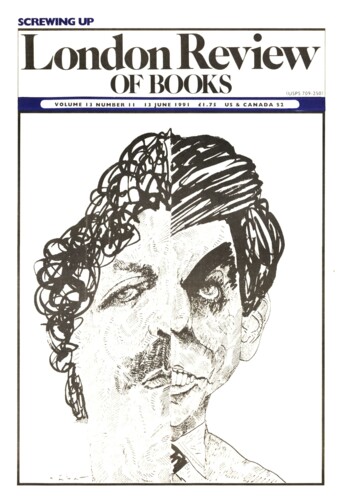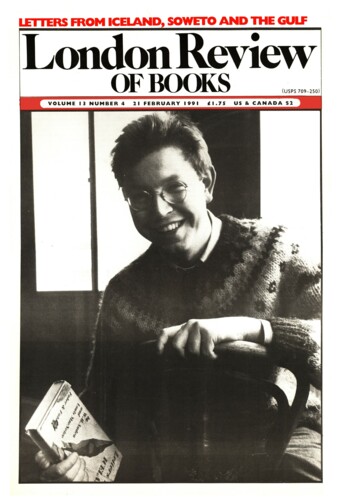Julian Symons
Julian Symons novel Sweet Adelaide was published earlier this year. His book of essays, Critical Observations, will appear next spring.
Making up
Julian Symons, 15 August 1991
The first page of Jeremy Reed’s ‘autobiographical exploration of sexuality’ finds him with ‘a red gash of lipstick’ on his mouth, pondering whether to take the ten steps down to a beach where men sunbathe nude. He is androgynous, 16, ‘looking for a new species’. James Kirkup also admits to androgyny and to a passion for make-up, from childhood when he experimented with his mother’s make-up box, through the time when, as head of the English Department at the Bath Academy of Art, he appeared in his own play for children wearing white tights and with gold sequins on his upper eyelids, right into middle age. Swinburne had a sympathetic line or two for androgynes:
City of Dust
Julian Symons, 25 July 1991
What Carlyle called the Condition of England Question – in our day, the country created by Thatcher and her sub-lieutenants – is surely the ripest subject on offer to novelists. The centripetal tendencies of a government that every year has affirmed its centrifugal intentions, the encouragement for financial whizzkids to enrich themselves and the brushing aside of accompanying financial scandals, the building boom based on an everrising tower of credit, and the collapsed public and private notions of morality, all cry out to be dealt with in fiction by the flat power of the Zola who in La Curée excoriated those who made speculative fortunes from Hausmann’s rebuilding of Paris, and in Pot-Bouille savaged the social and moral attitudes of bourgeois lives as seen in an apartment block occupied by the middle class. But Zolaesque naturalism has been out of intellectual fashion for a generation. Although the Condition of England Question does engage the attention of novelists, they approach it with glancing allusiveness, like Martin Amis, or cover it with the cloak of magical realism, which, whatever its dubious imaginative benefits, weakens any intended social point. So it is no surprise that Stuart Hood and Michael Dibdin concern themselves with the present state of society and morality via Science Fiction and a crime story.’
Bourgeois Masterpieces
Julian Symons, 13 June 1991
My friend and fellow crime writer John Creasey published more than seven hundred books under some twenty different names. (He also found time to found a political party called rather grandly the All Party Alliance, although a wit said that his only allies were Anthony Morton, Gordon Ashe, Michael Halliday and other Creasey pseudonyms.) His books were popular but not highly regarded, and this worried and baffled him. Why, he asked me once, was there thought to be so much difference between Creasey and Shakespeare? Wasn’t Macbeth a crime story? Didn’t he, like Shakespeare, write for the people rather than for intellectuals? The subject-matter was similar, the approach was similar, the difference simply that between prose and verse.
Urgent
Julian Symons, 21 February 1991
What a marvellous title, I said to friends when By Grand Central Station was published in 1945. Better not read the book, it can’t possibly live up to the title. Sure enough, On First Looking into Grand Central Station after nearly half a century’s abstention, that unserious assertion turns out to be dismayingly justified.
Pieces about Julian Symons in the LRB
Diamond Daggers
Stephen Wall, 28 June 1990
Death’s Darkest Face is Julian Symons’s 27th crime story, and its appearance coincides with an award (the Diamond Dagger) for his long service to the genre. This isn’t quite...
Porcupined
John Bayley, 22 June 1989
There is a cartoon by Beerbohm somewhere showing a distended G.K. Chesterton banging the table with his fist and saying he’d ‘had enough of all this bloody nonsense’. It seems...
Barriers of Silliness
J.I.M. Stewart, 1 July 1982
The first of Julian Symons’s ‘original investigations’, entitled ‘How a hermit was disturbed in his retirement’, is an apocryphal Sherlock Holmes story in which the...
Read anywhere with the London Review of Books app, available now from the App Store for Apple devices, Google Play for Android devices and Amazon for your Kindle Fire.
Sign up to our newsletter
For highlights from the latest issue, our archive and the blog, as well as news, events and exclusive promotions.




